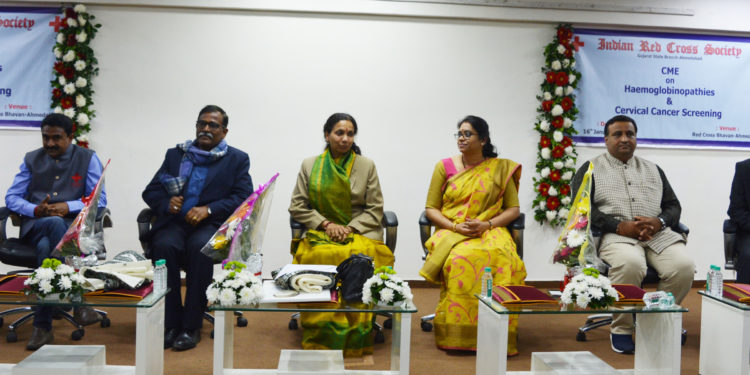NE HEALTH BUREAU
AHMEDABAD, JAN 17
The Indian Red Cross Society (IRCS) on Thursday announced the launch of Gujarat’s first molecular diagnostics technology for cervical cancer screening. Persistent infection of certain high-risk types of human papillomavirus (HPV) is known to be the primary cause of cervical cancer. When detected early, or in the pre-cancer stage, treatment can be highly successful.

Speaking on the occasion, Dr Jayanti S Ravi, Health Secretary, Government of Gujarat, said, “I welcome and appreciate the steps taken by the Indian Red Cross Society for making HIV screening facility available for cervical cancer. I would encourage women to undergo regular screening, to ensure that they are protected from the risk of cervical cancer.”
Dr. Prakash Parmar, Secretary, Indian Red Cross Society, Gujarat, said, “Owing to the high incidence and mortality rates associated with cervical cancer, there is an urgent need to establish a robust primary screening mechanism. Since cervical cancer is preventable, early screening can save lives and reduce the cost of healthcare considerably. With the launch of the city’s first screening facility, we have taken a step towards fulfilling our objective of making more women aware of the importance of regular and early screening.”
Dr. Sandeep Sewlikar, Medical and Scientific Affairs Head, Roche Diagnostics India, said, “Primary screening for cervical cancer has evolved over the past decade. The HPV-based DNA screening can accurately and safely test the presence of various strains of HPV, especially strains 16 and 18 that predominantly using cervical cancer in India.”
Dr. Vijayalakshmi Ramshankar, Cancer Institute (WIA), highlighted, “India contributes to 20% of the global cervical cancer burden and screening is often plagued with lower coverage of the targeted screening population. The utility of partial genotyping, identifying the high-risk genotypes for risk stratification has not been explored in our country before. The implementation of HPV DNA testing has begun with partial genotyping for the first time in an ongoing community based cervical cancer screening program from India.”
It is vital for women over 30 years of age to get HPV screened at regular intervals especially when they are sexually active. They must watch out for symptoms like heavy menstrual bleeding, bleeding after sex, foul-smelling discharge of blood, leg pain or discomfort after sexual intercourse. Most of these symptoms are dismissed as menstrual problems but require immediate intervention whenever they occur.”
We in future desire to include voluntary support of gynecologists for sample collection in every district. And will also going to promote the self-sample collection.
According to a study conducted among the female population in Gandhinagar by the Gujarat Cancer and Research Institute (GCRI), Ahmedabad, cervical cancer is the second leading cause of cancer death for women. The study showed that cancer of the cervix and breast constituted 27.57% of mortality in women. This study also noted that screening for uterus, cervix, oral and breast cancers could have a significant impact on reducing mortality related to cancer.
In India, cervical cancer is the second most common cancer in women (aged 15–44 years) after breast cancer accounting for almost 14% of all women cancer. It is also one of the very few preventable cancers.
Due to insufficient facilities and a lack of accessible screening, cervical cancer is late detected leading to high mortality rates. It is observed that screening programs conducted every 5 years in several countries have been able to reduce the incidence and mortality related to cervical cancer by 60%.
The programme is aimed at providing access to primary HPV DNA test with partial genotyping from a dedicated center for testing at Cancer Institute (WIA) for 30,000 women for 5 years in a community-based screening program.
The HPV DNA test is the first US-FDA approved test for cervical cancer screening, being clinically validated it is the most commonly used test in national screening programs of several countries like Netherlands, Australia, Singapore, Malaysia to name a few. Currently, it is being offered in women from north Chennai, in Manali and Thiruvottriyoor. The programme is being funded by Chennai Petroleum Corporation (CPCL), the refinery present in that area, as corporate social responsibility (CSR).
Cancer Institute (WIA), CPCL, and Roche Molecular Diagnostics are contributing to this great cause of early detection of this cancer. WHO aims to eradicate cervical cancer in 2035 and screen 70% of the eligible women to achieve this target. A scalable molecular HPV DNA test which is completely automated will be suitable to achieve screening a huge population of eligible women”









